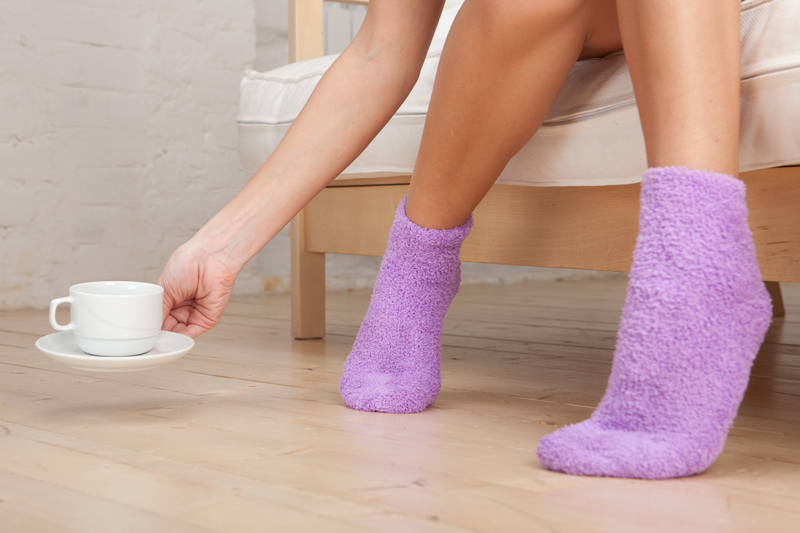Effective Methods to Eliminate Pet Odor
Posted on 11/09/2025
Effective Methods to Eliminate Pet Odor: A Complete Guide
Pet ownership brings companionship, love, and joy. However, it also can bring some unpleasant side effects--one of the most common being pet odor. Whether you're dealing with the stubborn smell of dog urine, cat litter boxes, or just that lingering "pet smell," effective odor control is essential for a fresh and welcoming home. In this comprehensive article, we'll explore the most reliable and proven methods to eliminate pet odor from your house, carpets, furniture, and even your pets themselves. Enjoy a fresher, cleaner home with these practical tips and strategies!

Understanding the Sources of Pet Odor
Before tackling the problem, it's important to identify the sources of pet odors. Below are the most common reasons why homes develop persistent pet smells:
- Urine and feces accidents--Frequent among both puppies and kittens in training, as well as older pets with health issues.
- Pet dander and fur--Shedding skin and hair can trap smells and allergens in your home.
- Natural oils--Animals' skin excretes oils that can permeate soft surfaces.
- Dirty and unwashed pet bedding.
- Litter boxes and cages--Improper cleaning leads to accumulations of odor-producing bacteria.
Best Ways to Remove Pet Odor at Home
Eliminating pet odor requires a multi-faceted approach. Below, explore the most effective methods for getting rid of pet odors from your living space.
1. Thorough Cleaning
The foundation of any pet odor elimination plan is regular and thorough cleaning. Dirt, fur, dander, and bodily fluids all contribute to the growth of odor-causing bacteria. Here are some essential cleaning tips:
- Vacuum all carpets, rugs, and upholstery at least twice a week. Use a vacuum with a HEPA filter to trap allergens and dander.
- Mop hard floors with pet-safe cleaners to remove sticky residue.
- Wash all pet bedding, blankets, and stuffed toys weekly in hot water.
- Clean litter boxes, cages, and tanks daily. Replace litter frequently.
2. Baking Soda: A Natural Deodorizer
Baking soda is a time-honored solution for neutralizing odors. It absorbs and eliminates smells instead of masking them.
- Sprinkle baking soda generously over carpets and let sit for 15-60 minutes before vacuuming.
- Add a half cup of baking soda to pet bedding in the wash.
- Use in litter boxes to control continual pet odor issues.
Pro tip: Always test small fabric areas before applying baking soda, especially on delicate carpets and upholstery.
3. Enzymatic Cleaners: Breaking Down Organic Odors
For tough stains and persistent pet odors--especially urine--enzymatic cleaners are highly effective. These products contain biodegradable enzymes that break down the proteins and ammonia in organic materials, permanently eliminating pet urine smells and stains.
- Follow manufacturer instructions for application and dwell time.
- Use liberally on fresh stains, allowing for deep penetration of affected materials.
- Always blot, don't rub, to avoid spreading the mess.
*For best results with repeated accidents or older stains, several treatments may be necessary.
4. Improving Air Circulation and Ventilation
Odors can linger in stale indoor air. Improve your home's air quality and odor control with these methods:
- Open windows and doors daily to air out the space.
- Use ceiling fans and portable air purifiers with HEPA and activated carbon filters.
- Replace HVAC filters regularly to remove pet hair and odors from circulation.
Redirecting airflow and keeping environments well-ventilated is key to naturally dispersing pet-related smells.
5. Odor Neutralizing Sprays and Products
For a quick fix or ongoing pet odor maintenance, commercial odor-neutralizing sprays can be highly effective. Choose products specifically formulated for pet odor elimination.
- Look for enzymatic, plant-based, or baking soda-based sprays.
- Avoid masking agents that only cover up smells with perfume.
- Apply after cleaning to both soft and hard surfaces for long-lasting freshness.
6. Deep Cleaning Upholstery and Carpets
Sometimes a surface-level clean isn't enough. For deep-seated pet odors in carpets and upholstery:
- Shampoo carpets with a pet-specific carpet cleaner every 2-3 months.
- Rent or buy a steam cleaner for a more thorough, chemical-free deep clean.
- Professional services offer industrial-strength solutions for persistent, set-in smells.
Focus on high-traffic zones and favorite pet napping spots for best results.
7. Grooming Your Pets Regularly
A clean pet means a cleaner home! Regular grooming greatly reduces the source of pet odors.
- Brush dogs and cats daily to reduce shedding and dander buildup.
- Schedule baths according to breed and coat type, using pet-safe shampoos.
- Wipe paws and fur after outdoor walks, especially in wet or muddy conditions.
8. Managing Litter and Pet Waste Areas
For cat and small animal owners, litter box odor can quickly overpower a room. Try these strategies:
- Scoop waste at least twice a day and replace all litter weekly.
- Wash litter boxes with soap and hot water during litter changes.
- Choose clumping, odor-control, or silica-based litters for best results.
- Place an open box of baking soda near litter areas as an extra safeguard.
9. Dealing with Pet Accidents Promptly
Accidents are part of life with pets. The sooner you address them, the better your chances to remove pet odors completely.
- Blot up liquid messes immediately with paper towels or rags.
- Apply enzymatic or pet-safe cleaners to the area; follow with a thorough rinse and dry.
- Use UV or blacklight flashlights to locate hidden or dried stains, especially on carpet.
Advanced Pet Odor Remedies and Prevention
Sometimes, it's necessary to take more advanced measures to control pet odor and prevent it from returning. These include:
10. Activated Charcoal or Zeolite
Both activated charcoal and zeolite are natural odor absorbers. They work by trapping and neutralizing molecules that cause foul smells.
- Place small bags or open containers near pet beds, litter boxes, and high-traffic areas.
- Replace or recharge monthly for continued effectiveness.
These products are safe, non-toxic, and especially useful for enclosed or poorly ventilated spaces.
11. Essential Oils (Use with Caution)
Some essential oils offer mild deodorizing effects and create a pleasant home aroma. However, it's vital to use them cautiously, as many oils (like tea tree, citrus, or eucalyptus) can be toxic to pets.
- Opt for well-ventilated spaces and dilute oils in water for sprays.
- Never apply oils directly to pets or where they may ingest them.
If in doubt, consult your veterinarian before using essential oils around pets.
12. Wash Walls and Baseboards
Don't forget vertical surfaces! Odors can cling to walls and baseboards--particularly in rooms used by pets or those with repeated accidents.
- Wipe down with a mild, pet-safe cleaning solution at least once a month.
13. Professional Odor Removal Services
When all else fails, consider hiring a professional for odorous home treatments.
- Professionals use industrial-grade cleaners, ozone generators, or thermal fogging devices.
- This is especially helpful for stubborn or chronic issues (rental properties, multi-pet homes, real estate sales).
Tips to Prevent Pet Odor Recurrence
The best way to maintain a fresh-smelling home is to combine cleaning with good habits. Consider the following preventive tips:
- Invest in washable, odor-resistant pet beds and covers.
- Train pets to use designated potty areas, both indoors and outside.
- Feed high-quality diets with fewer fillers, as this reduces waste odor.
- Keep pets healthy with regular vet checkups to address possible underlying causes of excessive odor.
- Establish a regular cleaning and grooming routine.
Natural Home Remedies for Pet Odor Removal
Combining commercial products with natural odor removers for pets can be effective, economical, and safe. Here are a few DIY solutions:
- White vinegar: Mix equal parts vinegar and water for a powerful degreasing spray on floors and fabrics. Allow to dry thoroughly to avoid vinegar's own smell lingering.
- Hydrogen peroxide and baking soda: This combo is excellent for removing urine smells from carpets. Soak, let sit, then blot and rinse. (Always patch test first!)
- Lemon juice: Natural citric acid helps break down stains and odors; add to rinse water for floors or dilute for deodorizing wipes.
- Sunshine: UV light kills bacteria and freshens fabrics naturally. Place pet bedding, pillows, and toys outdoors for a day in the sun.
*Always check with your vet before introducing new ingredients, especially if your pet has allergies or skin sensitivities.
The Importance of Cleaning Your Pet's Belongings
Toys, leashes, collars, bowls, and carriers can all accumulate pet-related odors. Wash or wipe them weekly, and disinfect food and water bowls daily. This helps keep pet smell under control throughout your home.

Frequently Asked Questions About Pet Odor Removal
- How can I prevent my house from smelling like pets? Stay ahead with routine cleaning, wash pet items often, and address accidents instantly. Use air purifiers and odor-absorbing materials for continuous freshness.
- How do I get rid of pet odor in carpets? Use baking soda, enzymatic cleaners, and regular deep cleaning with a carpet machine. Spot-treat new stains quickly for best results.
- Is it OK to use scented candles or air fresheners? Scented products should only be used in well-ventilated spaces and never placed where pets eat or sleep. Opt for pet-safe varieties to minimize health risks.
- What if pet odor keeps coming back? Persistent smells may indicate hidden accidents or untreated areas. Investigate thoroughly, use blacklight flashlights for invisible stains, and repeat deep cleaning steps as needed.
Conclusion: Maintain a Fresh, Odor-Free Home with Pets
Living with furry friends doesn't mean sacrificing a clean and pleasant-smelling home. By combining regular cleaning, smart habits, and proven odor-elimination strategies, you can effectively remove pet odors and prevent them from returning. Invest a little time in maintenance, and both you--and your guests--will enjoy a welcoming, fresh environment every day. For more pet odor removal tips, consult your veterinarian or professional cleaners to address unique challenges.
Remember: a little prevention and consistency go a long way in keeping your home sparkling, inviting, and truly pet-friendly!





